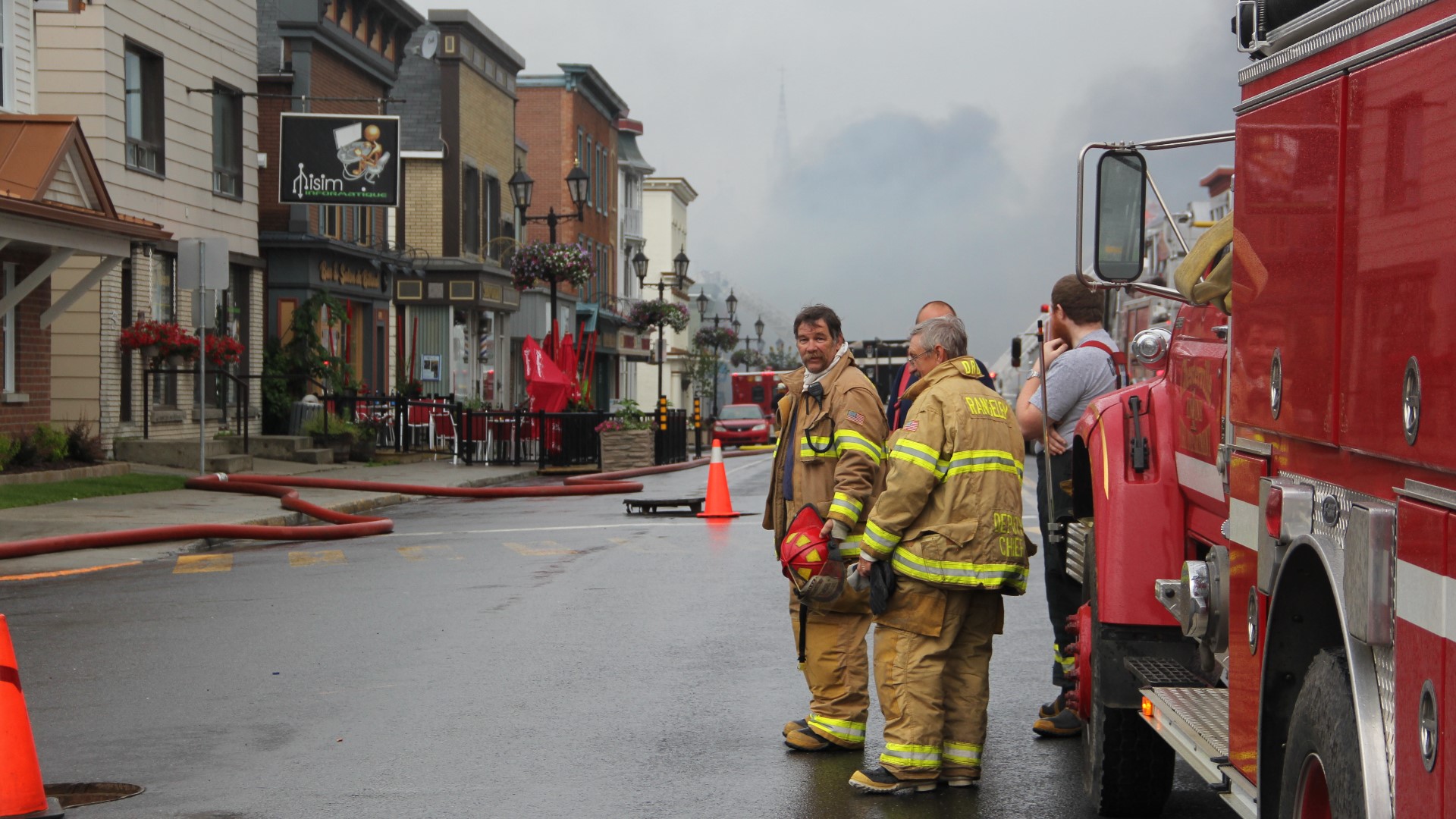RANGELEY, Maine — The morning of July 6, 2013, is one a select group of Maine firefighters will never forget. It was on that day 10 years ago when the Canadian town of Lac Megantic was on fire.
Around 1 a.m., an unattended train carrying crude oil barreled down a hill and derailed on a corner at the top of the city's downtown. Forty-seven people were killed in the resulting explosions, and rivers of oil on fire poured down the street, destroying homes and businesses along the way.
Overwhelmed by the work, firefighters there put out a desperate call for help, and some of that help came from across the border in Maine.
Towns like Eustis, Rangeley, Farmington, and Strong all sent trucks and crews. While many have retired or moved on to other departments, we spoke with four people who are still working in Rangeley about their first call for mutual aid across the border.
"The call came through as, 'Help us save our town,'" Harold Shaetzle remembered of July 6, 2013. It was a call he heard around 4 a.m.
He and Dennis Marquis grabbed a fire truck and drove. Tammy McGarvey and Tiger Sikes met them at the scene.
These firefighters were accustomed to providing mutual aid, but they had never crossed the Canadian border with a truck before. In fact, they weren't even sure they could.
"The gates were up, and they were waving us through as we got to the Canadian border," Shaetzle said.
"They kind of specifically asked for certain things," Marquis remembered. "They wanted towers [ladder trucks], and they wanted foam, because what they had was a lot of train cars that were leaking oil and were on fire."
It's about an hourlong ride to the Coburn Gore border crossing from the town of Rangeley, then Lac Megantic is another half-hour. There isn't much between the two, though.
"If you know that road, it goes up a long Lake Megantic. You travel along Lake Megantic quite a ways, so as your crest over the top of that hill, you're still about 5 miles away from town," Marquis said about the drive.
It was the moment they understood the gravity of the call.
"There was this giant black column of smoke. I mean, you could tell this was an extremely serious fire," Marquis said.
"What had happened when these cars derailed [is] all of this oil spilled into town, and it naturally headed toward Lac Megantic. And as it did, it ignited, and so it went right through this neighborhood of houses and everything was just fire," Marquis said.
"Then all of this oil leaked into the storm sewers and the sewer manholes and then ignited, and when it did, it blew all of the covers off on the manholes," Marquis continued. "Another thing it also did is it destroyed the infrastructure for the fire hydrant system, so there was no fire hydrants. You couldn't use the fire hydrants."
"You walk through town later on, it was very eerie to see just basement holes, foundation holes," Shaetzle added.
"And they were full of wall-to-wall oil," Sykes remembered. "Nothing left but the cellar hole, right full of oil."


Despite a language barrier and hose fittings that didn't match up to Canada's systems, Maine crews got to work and started utilizing the lake.
"We were getting water pumped to us from the town of Eustis. They were pumping out of the lake, and then we were spraying our water on the tanks," Marquis said. "We were also providing water for working handlines for the Canadians. That means this truck pumped steady for 24 hours, and so did the tower."
Rangeley's focus ultimately became trying to keep train cars that hadn't yet caught fire cool enough so they wouldn't ignite.
"But you could hear tank cars blowing up all night long," Shaetzle said.
For many reasons, the scene wasn't safe for anyone in town, let alone the crews from all over Canada and parts of Maine battling the fires.
"In fact, they came around to Harold and I that night, and they gave us a mask to wear ... because you were breathing in a lot of this stuff, not only from the smoke of the burning oil, but if the oil itself was very toxic," Marquis said.


When all of the fires were finally under control, Maine's crews were fed some food from a wedding reception that had been canceled, then said their goodbyes.
"A lot of the Canadian firefighters that had heard we were getting ready to leave came from down behind the town hall ... and they were hugging and thanking us, and you know, we were packing up getting ready to go, and it was almost like you wanted to stay and just keep helping, but at the same time we had to get back and protect our own communities," Sykes said.
"It was hard to leave. I think that's true," Shaetzle agreed.
"You just wanted to do more," Marquis added. "My thoughts stayed with the people up there about: I just can't imagine. I'm going home to my safe home, and they are just beginning to deal with this thing up there."
The city was just beginning as we learned when our NEWS CENTER Maine crew went up a few weeks after the train derailment, then again 10 months later. A new downtown was rebuilt on Papineau Street, running parallel to the old downtown, but it wasn't the same.
The old downtown was blocked off for two and half years, while buildings left standing were removed, as was tons of soil. Two and a half years of a complete decontamination, then years of rebuilding.
Our crews went back to Lac Megantic for the 10-year mark, to see how the community has rebuilt. Stay tuned for that story.

